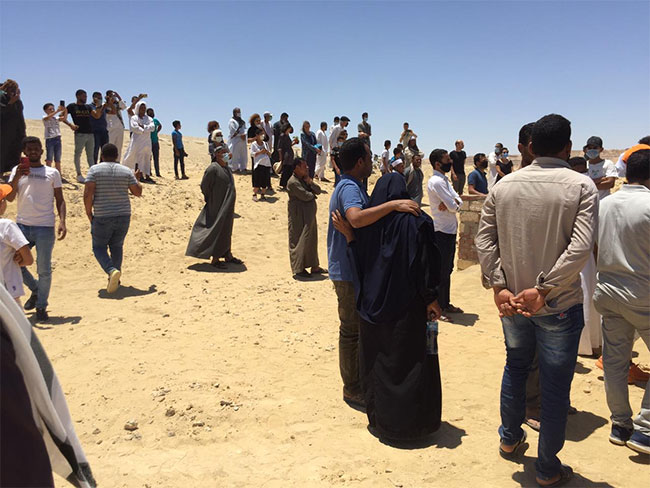Amira Noshokaty - Al Ahram

(Photo: Mohamed Abu Zeid)
This morning, the whole village of Tunis – located in the Fayoum governorate – attended the funeral of Evelyne Porret, who was known as “the lady of Tunis village.” The Swiss artist, who lived in Tunis since the mid-1980s, was a key mentor of pottery and the founder of the village’s Fayoum Pottery School. “Evelyne is Tunis,” explained Rawya Abdel Qader, the first girl to attend Porret’s pottery school.
“I remember how she stood by me and helped me travel with my work to France and stay there for a whole month, how I was the only girl who did not get married at 12 years old, continued to study in her school and ended up being the first woman in Tunis village to own and run a pottery business,” explained Rawya Abdel Qader to Ahram Online.
“Thanks to her, now several girls who were students of Evelyne have their own pottery workshops, my daughter included. She opened the door for all of us.” “It is a black day for the whole village,” she concluded.

Inside the pottery school of Evelyne. (Photo Zeina Spinelli)
After Porret established the Fayoum Pottery School in Tunis, the village gained an international reputation for its pottery. “Before Evelyne there was no pottery in Tunis village,” explained Mohamed Abu Zeid, professor of pottery and resident of Tunis village. “Before that, the whole village lived off crops and fishing. She established a non governmental organization (NGO) called Betah for training urban and rural children in pottery, and now the entire population of the village are potters who are members of this NGO,” noted Abu Zeid

Inside the pottery school of Evelyne. (Photo Zeina Spinelli)
“Tunis is one of the best practitioners of eco-tourism. The pottery school that Evelyne established in the 1980s has improved the living conditions of many families and put Tunis on the tourism map of Egypt. She trained children with great passion and respected their natural talents and freedom of creativity. I had the opportunity to work with some of these children that opened their own workshops in the village,” development specialist Zeina Spinelli explained to Ahram Online. “This is sustainability. She created a development model, jobs, socio-economic opportunities using local materials and building capacities, and developed quality products and pieces of art that are sold locally and abroad,” noted Spinelli.
The results of her work are impressive and resonate in the success stories of all her students.

Tunis village at the funeral of Evelyne. (Photo Mohamed Abla)
“Evelyene is simply my mother,” explained Mahmoud El-Sherif, one of her early students. “She taught me to be honest with myself and how the best art comes from within, and how it reflects the artist’s personality,” El-Sherif explained. Currently he is launching his own pottery school abroad, adopting Evelyen’s school of thought. “She used to introduce me and my colleagues and let us represent her school in media and in conferences, because she wanted the new generation to be acknowledged. Now that we are all members of the NGO, we host the annual Tunis Village Pottery Festival and the generations she taught are teaching others. This is sustainable development that does not stop with one person. She did this,” noted El-Sherif.
“She has planted the seed in Tunis village and by teaching around 100 potters, her learning will live centuries ahead,” explained Abdel Satar Abdel Rahman, one of her students and a renowned potter in Tunis village. “On a human level, Evelyne was a really a great human being who chose to give,” explained renowned artist Mohamed Abla, who is a resident of Tunis village and a friend of Evelyne.
“She had her own art workshop, yet she chose to teach the children of Tunis. She defied very difficult circumstances for she was a foreigner who aimed to teach girls. Her persistence and generosity in giving time and effort paid off and she changed the whole lifestyle of the entire village, transforming it into the most famous village in Egypt. The economic status of the whole village grew better and their income increased drastically,” added Abla.
“On the artistic level, she was a very talented ceramic artist and potter and her ability to explore and create new ideas was amazing. She studied pottery in Switzerland and when she came to Egypt, she was the student of Saeed El-Sadr. She also worked at Wissa Wassef’s pottery and tapestry factory in Garagous, and invented a stitch that is named after her among the handmade stitching heritage of Akhmim,” he added.
She was a woman who inspired all of her students with her resilience, persistence, and the passion she held towards art and artisans till the last minute of her life.